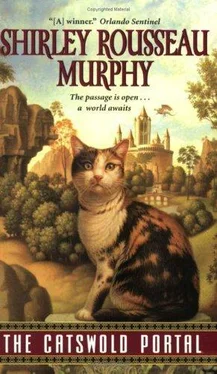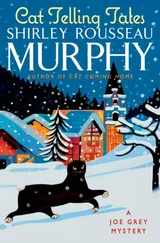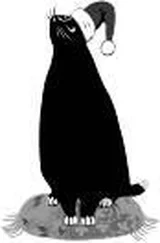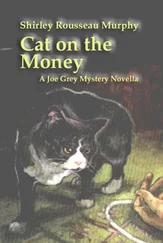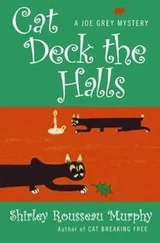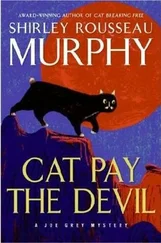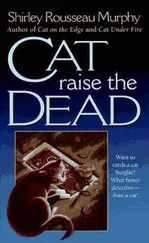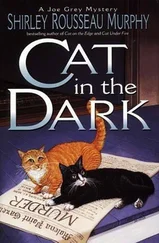Shirley Murphy - The Catswold Portal
Здесь есть возможность читать онлайн «Shirley Murphy - The Catswold Portal» весь текст электронной книги совершенно бесплатно (целиком полную версию без сокращений). В некоторых случаях можно слушать аудио, скачать через торрент в формате fb2 и присутствует краткое содержание. Год выпуска: 2005, ISBN: 2005, Издательство: HarperCollins, Жанр: Старинная литература, на английском языке. Описание произведения, (предисловие) а так же отзывы посетителей доступны на портале библиотеки ЛибКат.
- Название:The Catswold Portal
- Автор:
- Издательство:HarperCollins
- Жанр:
- Год:2005
- ISBN:9780060765408
- Рейтинг книги:4 / 5. Голосов: 1
-
Избранное:Добавить в избранное
- Отзывы:
-
Ваша оценка:
- 80
- 1
- 2
- 3
- 4
- 5
The Catswold Portal: краткое содержание, описание и аннотация
Предлагаем к чтению аннотацию, описание, краткое содержание или предисловие (зависит от того, что написал сам автор книги «The Catswold Portal»). Если вы не нашли необходимую информацию о книге — напишите в комментариях, мы постараемся отыскать её.
The Catswold Portal — читать онлайн бесплатно полную книгу (весь текст) целиком
Ниже представлен текст книги, разбитый по страницам. Система сохранения места последней прочитанной страницы, позволяет с удобством читать онлайн бесплатно книгу «The Catswold Portal», без необходимости каждый раз заново искать на чём Вы остановились. Поставьте закладку, и сможете в любой момент перейти на страницу, на которой закончили чтение.
Интервал:
Закладка:
He wasn’t ready to do that. But it was nearly impossible to get himself to work. He’d done everything to avoid work—had gone sailing, climbed Mount Tam half a dozen times, even ridden a couple of times at the local stables as he used to ride with Alice, trying to make himself enjoy being out on the yellowed summer hills, maybe make some facet of the landscape come alive enough to want to paint it. But even going to the stables, glimpsing Alice’s favorite mare, had thrown him into depression.
He’d made every excuse to avoid Chapman seeing the few dull paintings he had produced since his last show—he’d gone out of town, gone down the coast to Carmel. He had remained filled with defeat, feeling like he might as well be painting soup cans.
Maybe he should be, maybe someday they’d all paint soup cans—flat designs done with a mind as flat as that of a store mannequin, passionless, sexless.
But this was 1957 and the world of painters was filled with passion: the exploding passion of Still, of Kline, the inflamed vision fostered by Picasso, and echoes of the Bauhaus, and with his own kind of painting, with the work of the Bay area action painters, their colors the glowing hues of California, opulent as stained glass.
He dumped his coffee out, looking absently up the terraces. The gardener had moved to a hydrangea bush. Snip, snip, snip—an annoying, suggestive sound. Braden stared at his sketch pad thinking of excuses to do any number of unnecessary chores in the studio: stretch more canvases for more dull paintings, make a list of supplies, sweep the floor. The garden grew lighter, the hidden sun sending a blaze of gold along the top of the redwood forest. Halfway up the terraces a yellow cat came out from beneath a fuchsia bush and slipped warily away from Vrech; the cat’s distrust of the gardener stirred sympathy in Braden even if it was only a cat.
There were five or six cats living in the garden. He ignored them and they ignored him; cats made him uneasy. Cats watched people too intently, and they weren’t loving like dogs. He glanced up the hill to Olive’s two-story house; its age-darkened siding blended into the dark forest behind it. There was a cat on Olive’s front porch, crouched, watching the gardener. To the right in Morian’s gray, two-story frame, a light had come on in Morian’s bedroom behind her bamboo shades. He could see her moving around, caught a glimpse of her dark arm reaching just behind the shade. She would be getting ready for an early class. To the right of Morian’s, nearest to the dead end lane, Anne Hollingsworth’s one-story, white Cape Cod was still dark. Three neighbors, three single women—Anne divorced, Olive a dry old spinster, and dark-skinned Morian with plenty of men in her bed. The three were the most unlikely of friends, as different as three women could be, but they were close friends; and they had looked out for him tenderly since Alice died. In weak moments he admitted he needed them in the casual, secure context of neighbors. Though Morian was more than neighbor, gracing his bed occasionally with offhand pleasure and tenderness.
As he picked up his shoes and bent to put them on, the gardener came slouching down the terraces. Vrech looked straight through him, didn’t acknowledge him, then turned and went into the tool shed, shutting the door. The action stirred a memory without any connection: he’d dreamed of Alice last night, the same nightmare he’d had a thousand times, Alice lying unconscious over the steering wheel. The flames of the cutting torches. His helpless rage. He had waked shouting and lashing out at the car in which she lay trapped.
Vrech came out of the tool room wearing a Levi jacket and carrying a brown paper bag. He shut the oak door, not turning to look at the carved cat faces that protruded from the old, darkened planks that formed the door. He headed across the garden to the lane, and quickly crossed the lane, heading toward the village.
The man usually drove a green Ford, but it wasn’t there today. Strange that he’d come to work so early and stayed such a short time. Maybe his car was in the shop, maybe he’d left to pick it up. Braden stood looking after him idly, then on impulse he went up the garden to the tool shed and, despite his repugnance at touching the door, he opened it to look inside.
He didn’t know what he’d expected to see. The dark little room contained only a wheelbarrow, the ladder, the work table, and some scattered garden tools. The table was littered with seed packets, and with clay pots to which dry earth clung. A hoe and shovel leaned against the dirt wall beside some bags of manure. He studied the stone wall that formed the back of the room, keeping the hill in check. Overhead, heavy timbers held the earth solidly. Someone had taken a lot of trouble building this hillside cellar. It had been in the garden longer than Alice’s Aunt Carrie could remember. Carrie had played here when she was a child, as, later, Alice did, and then Alice’s little foster sister. The cave seemed a depressing place for a child, though usually they had played on the brick pad in front of the door, making up games that included the carved cats, and talking to the cats. He breathed in the smell of raw earth, and backed out of the cave. A tendril of the cup of gold vine that framed the door slid across his neck, startling him. He grabbed the offending limb and broke it off. Why didn’t the gardener keep the damn vine trimmed? The vine’s ancient, twisted limbs were so old and thick they formed a heavy, rough frame for the carved door. Suddenly, watching the medieval cats’ faces, he felt chilled. He turned away abruptly and headed down toward the studio; he could almost feel the damned cats watching him.
Chapter 5
Mag, I’ve gone to the Wizard in Marchell, please don’t follow me. I must do this. I love you.
Melissa wrote the note in a thick layer of dust that she made appear on the supper table. Around it she wove a tangle of spells which would confuse Mag and make her laugh; the old woman was less likely to follow her if she showed some style. She didn’t like hurting Mag, but it couldn’t be helped. She dared not tell her where she was really going—Mag would come storming after her and with harsh words, maybe with spells, would force her home again. She pulled on her cloak, shoved her knife in its sheath, and fastened on her trinket bracelet for trading. With the pack, a lantern, and the full waterskin she quit the cottage, slipping out into the dark green night.
The way up the cliffs was precarious in the dark, with drop-offs and loose stones. But when at last she topped the cliff and started down the other side, the path was easier. Where the stone sky was lowest, white bats darted and squeaked overhead, skimming along after insects. She tied her hood to keep them out of her hair, though they stayed away usually, unless someone had laid a spell. Bat-spells were a prank children played, or feuding village women. When the sky rose again, black cliffs loomed against it, and on her right a precipice dropped. She didn’t light the lantern but brought a spell-light; it could be doused faster in case of night-traveling horsemen who would surely be queen’s soldiers. She thought it must be near to midnight when she turned onto a path between cliffs too narrow to be traveled by horsemen. She didn’t want to happen on a band of rebels, either, going about some secret business. Too many of the rebels knew her and would tell Mag they had seen her. Soon she was skirting the ice caves, shivering with cold.
She had no notion how she would proceed when she reached Affandar Palace, except to ask for work in the scullery. She shivered with more than cold when she thought about descending into the palace dungeons to search for the Toad and for the captured rebels.
Читать дальшеИнтервал:
Закладка:
Похожие книги на «The Catswold Portal»
Представляем Вашему вниманию похожие книги на «The Catswold Portal» списком для выбора. Мы отобрали схожую по названию и смыслу литературу в надежде предоставить читателям больше вариантов отыскать новые, интересные, ещё непрочитанные произведения.
Обсуждение, отзывы о книге «The Catswold Portal» и просто собственные мнения читателей. Оставьте ваши комментарии, напишите, что Вы думаете о произведении, его смысле или главных героях. Укажите что конкретно понравилось, а что нет, и почему Вы так считаете.
